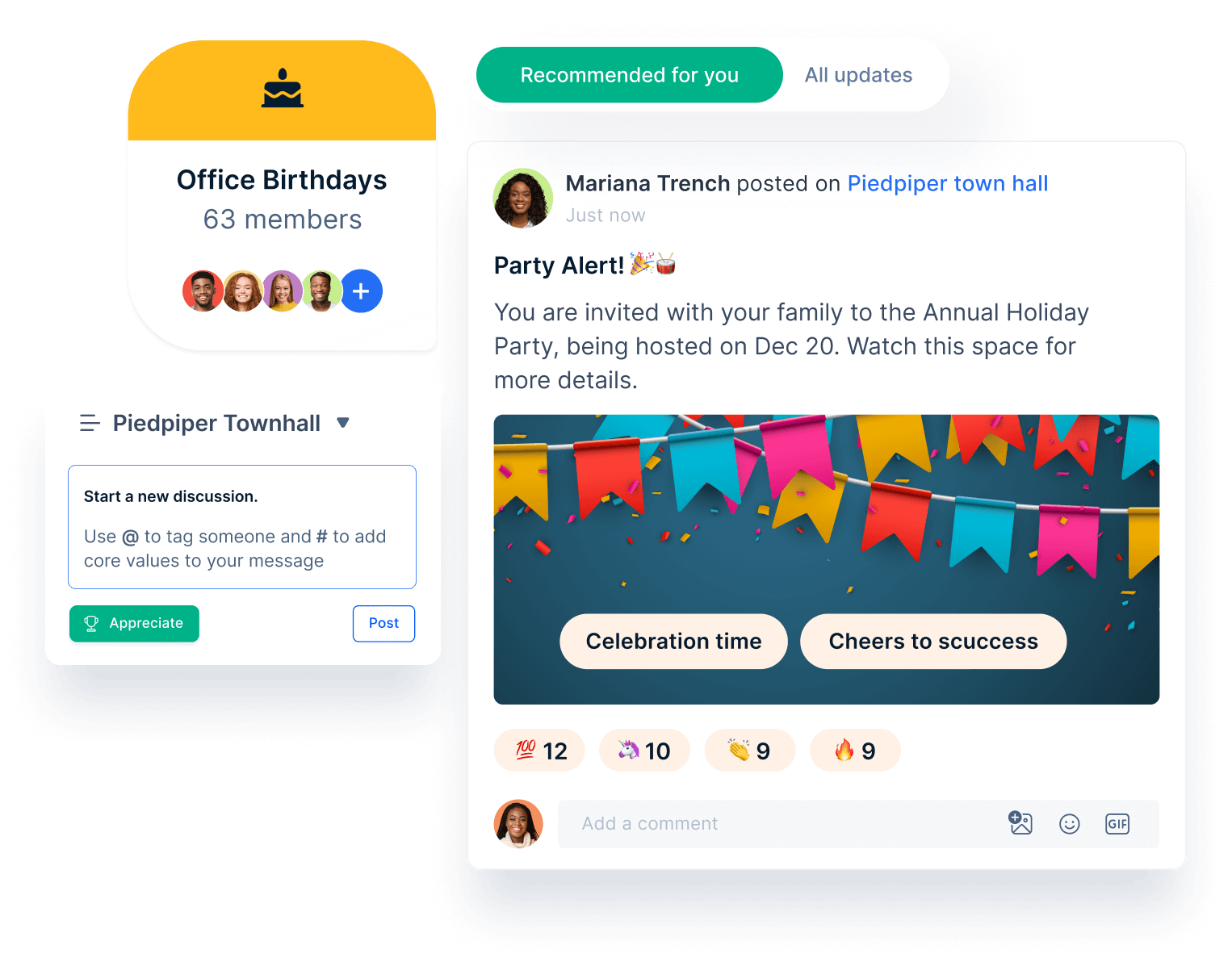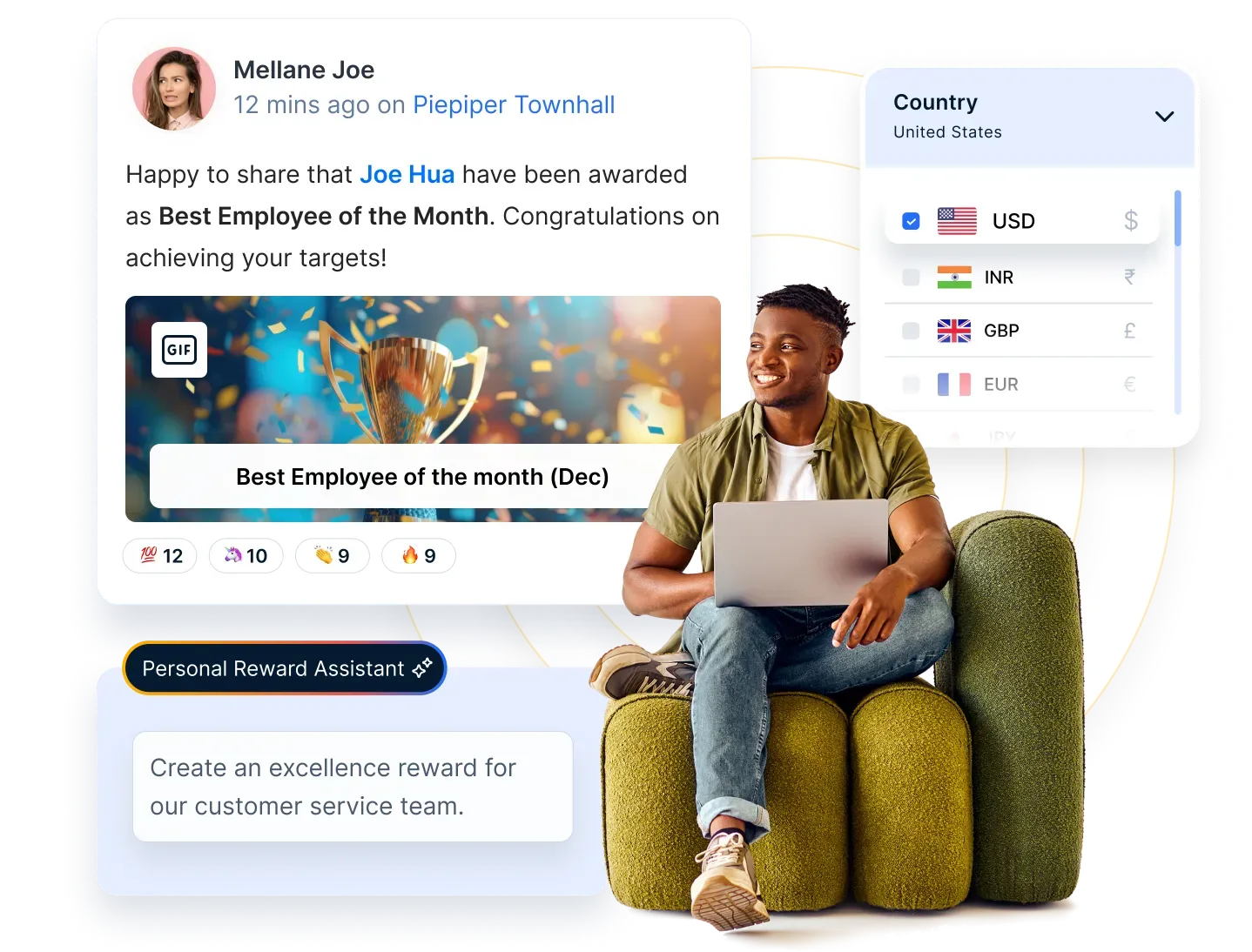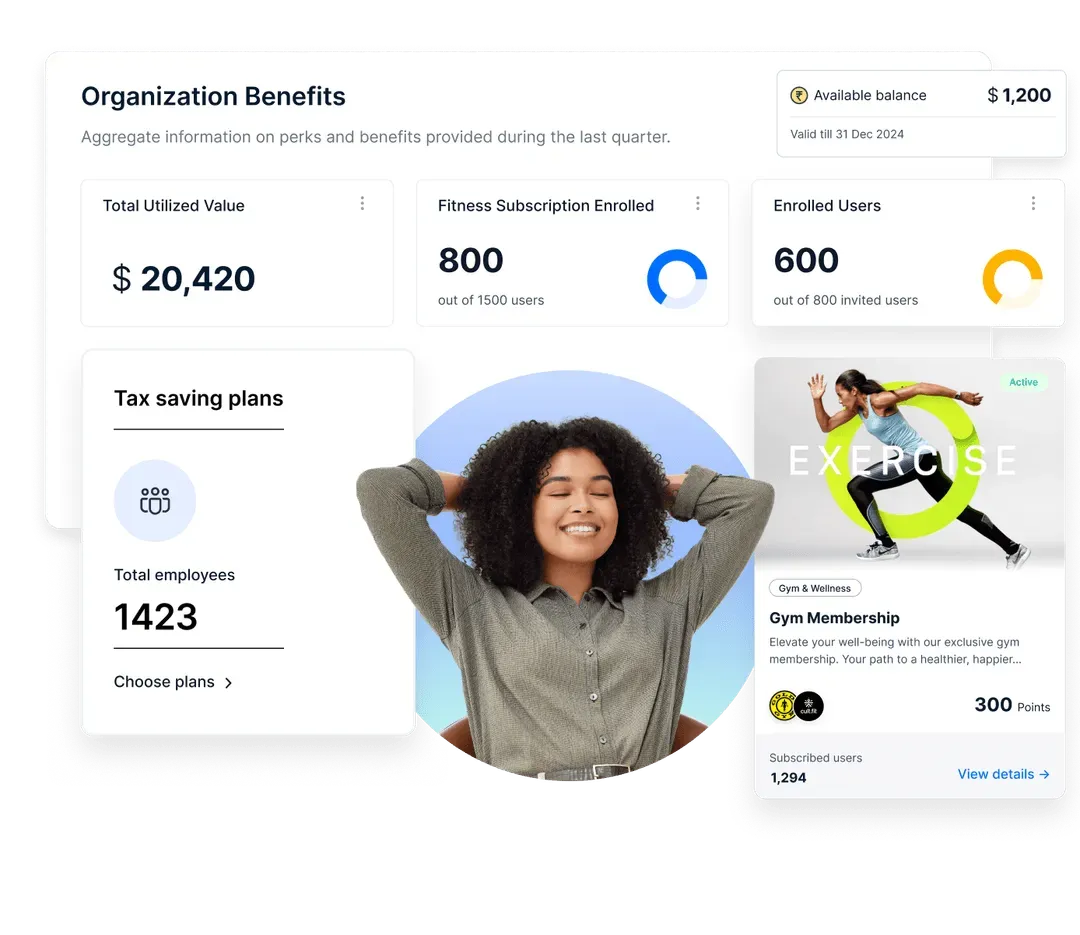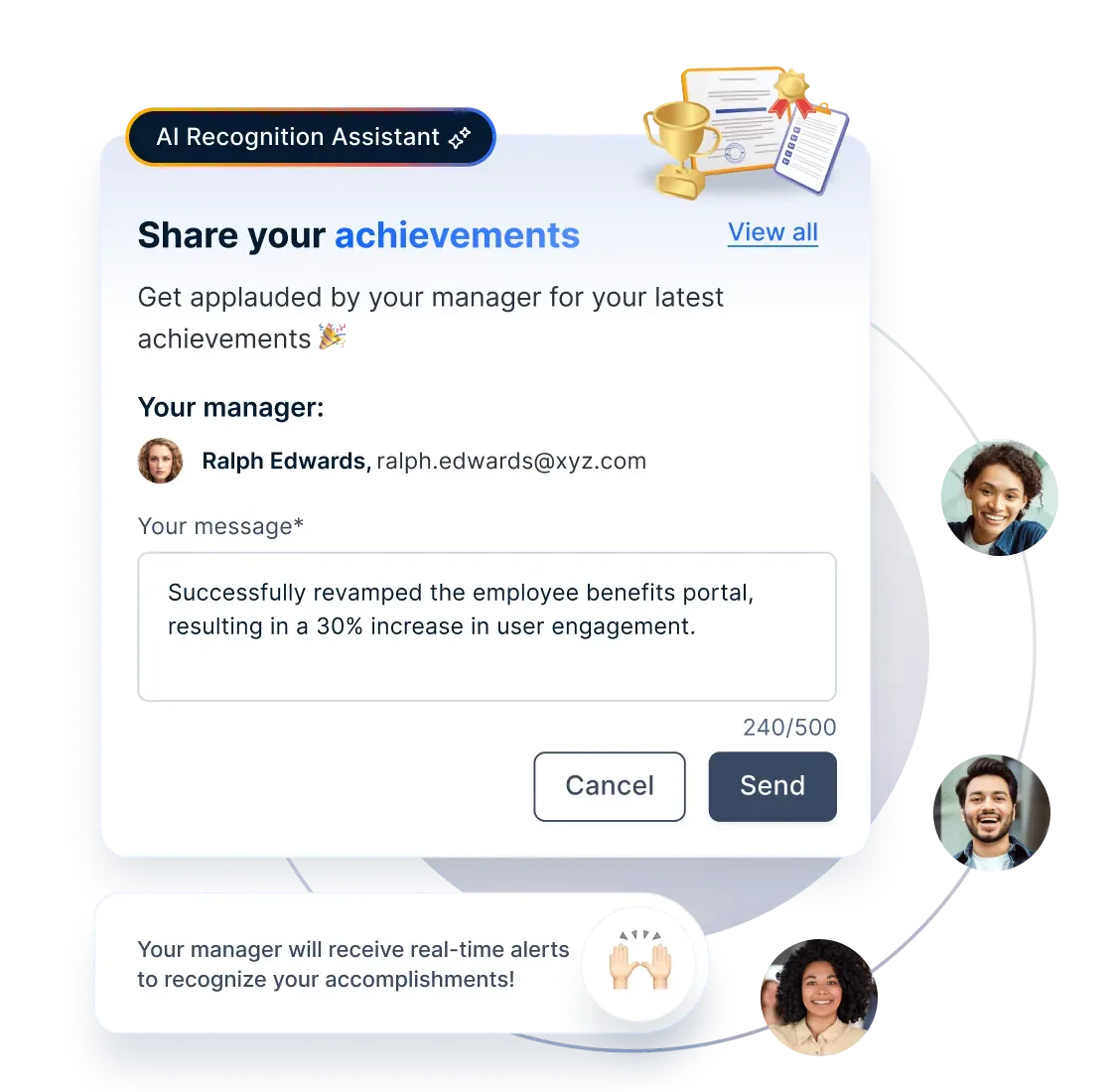Emotional Intelligence in the Workplace: Why EQ Matters More Than Ever
Explore the power of emotional intelligence in the workplace. Learn how EQ impacts communication, leadership, and teamwork—and how Empuls enhances it across your organization.
On this page
- What is emotional intelligence?
- The four components of emotional intelligence
- Why is emotional intelligence important for success?
- How to identify a lack of emotional intelligence
- How do people with high EQ differ from those with low EQ in the workplace?
- Emotional intelligence components at the workplace
- How Empuls enhances emotional intelligence at work
- Conclusion
Emotional intelligence means the ability to understand and manage our emotions effectively while understanding other people's emotions and responding appropriately. Also called Emotional Quotient (EQ), it is necessary to maintain healthy and respectful relationships at work and personal life.
In a world increasingly automating many mechanical tasks, the future of work involves more human interactions and internal personal relationships that machines cannot take over. Hence what was once the norm to consider only the intelligence quotient (IQ) of people for job interviews is now slowly evolving to include the emotional quotient (EQ).
The list of "Future of Jobs Report 2020" published by World Economic Forum, details Emotional Intelligence in the workplace as one of the top 16 emerging skills required in the workforce of tomorrow. So how important is emotional intelligence? This article takes a closer look.
What is emotional intelligence?
Emotional intelligence refers to a person's ability to discern and contextualize their emotions and the emotions of others around them. The term was coined in 1990 by Peter Salovey and John D Mayer and was popularized by Daniel Goleman, a psychologist, and author in his books. In theory, people possess different types of intelligence, which helps them excel at different disciplines, such as music, sports, or math.
Emotional intelligence in the workplace involves
- Intrapersonal intelligence: awareness of one's values, thoughts, and beliefs and being in harmony with it.
- Interpersonal intelligence: detecting other people's moods and responding to their desires, expectations, and motivation.
While traditional intelligence (quantified by IQ) is necessary for the objective treatment of the world, emotional intelligence (quantified by EQ) is necessary for subjective backing. In a business setting, both EQ and IQ are crucial as each has a moderating influence over the other.
The four components of emotional intelligence
To build workplace emotional intelligence, it's important to understand its four core elements:
1. Self-awareness
This means recognizing your own emotions and how they affect your actions. It helps you understand your strengths and areas for growth.
2. Self-management
This is about controlling your emotions, especially during stress. It includes staying positive, flexible, and focused on goals.
3. Social awareness
This involves understanding others’ feelings, especially in a group or team setting. It includes showing empathy and being aware of social cues.
4. Relationship management
This means building and maintaining healthy relationships. It includes clear communication, conflict resolution, and collaboration.
Why is emotional intelligence important for success?
In the book "Emotional Intelligence: Why It Can Matter More Than IQ." Daniel Goleman argues that EQ plays a crucial role in the workplace and it's a critical predictor of success in life. While the role of IQ was widely known, Goleman's work quickly gained the attention of business leaders and human resource managers.
Research has suggested that EQ has a significant role in how employees manage stress, handle interpersonal relationships, and even navigate conflict, all affecting job performance and satisfaction.
One study also suggests that employees with high EQ scores are better at interpersonal functioning, stress management, and leadership abilities.
While traditional intelligence is necessary for success in general, Goleman also suggested that people who are highly successful at work are not only innovative but also have a high EQ. Emotional intelligence is essential for leaders in top management and all employees at every level of the organization.
Succeeding in a career requires both IQ for the technicality of the role and the people skills that come with having a high EQ.
-> More than 40% of the leaders in a recent survey agreed that emotional intelligence will be a "must-have" skill for employees in the next 3 years.
-> EQ accounts for 90% of the difference between outstanding and average managers.An internal PepsiCo study found that managers with high EQs outperformed yearly revenue targets by 15%-20%.
-> A study spanning 40 years at UC Berkeley found that EQ was 4X better than IQ in predicting success across different fields.
How to identify a lack of emotional intelligence
A lack of emotional intelligence in the workplace often leads to misunderstandings and conflicts. This usually happens when someone cannot recognize or understand emotions—either their own or others’.
One of the most obvious signs is having trouble expressing or controlling emotions. You may find it hard to respond to a co-worker’s concerns in the right way. You might also struggle with active listening.
Think about your interactions with colleagues. Ask yourself:
- Do your conversations feel tense or awkward?
- Do you often blame others when things go wrong?
- Do you have emotional outbursts?
If you answered yes to any of these, it could mean low emotional intelligence.
Improving emotional intelligence at the workplace starts with practicing empathy and building strong social skills. These skills help in creating better communication and stronger teamwork.
How do people with high EQ differ from those with low EQ in the workplace?
The difference between people with high and low EQs can be contrasted in any workplace. It appears across various areas, such as interaction with others, business decision-making, personal decision-making, conflicts, conversations, and highly stressful times.
The emotional intelligence test helps to identify and analyze how any individual mind works. Here is how it looks.
Characteristics of employees with high EQ
Here are some of the characteristics you can expect to find in people with high EQ
1. They're effective communicators
People with high EQ communicate their thoughts clearly and respectfully while being cautious of the words they use. Their conversation skills always positively influence their coworkers, and they're liked by everyone wherever they go.
2. They're compassionate listeners
Communication is a two-way street; hence, they are good at speaking and active listening. They can listen to others empathetically and respond appropriately to their emotional states.
3. They're great at conflict resolution
Whether the conflict is direct in the form of a combative coworker or an unruly client in a meeting, high EQ employees are masterful at conflict avoidance and resolution. They can de-escalate a situation through compassion and diplomacy rather than getting pulled into fruitless arguments that can ruin relationships.
4. They express themselves confidently and openly
In most workplaces where people are afraid of being open, people with high EQ express themselves confidently. Being more at ease with their thoughts and convictions, they wouldn't mind being open when necessary and even taking constructive criticism.
5. They embrace changes
Change can often be uncomfortable and drive people into uncharted waters. However, it also has growth potential and is sometimes inevitable whether they like it. High EQ people accept change and are self-motivated to navigate through challenges. They respond positively to new initiatives and take on higher responsibilities to rise to the occasion.
6. They have excellent social skills
People with high EQ can collaborate with coworkers or any new team they join. They are fun to hang out with at and after work and build outstanding social bonds. They are also great at meeting new people and networking, making them an important asset to the organization.
7. They are flexible and creative
A defining characteristic of people with high EQ is flexibility regarding changing demands. As leaders, they don't expect their teammates to work the same hours as they do, live by the same values, or hold the same priorities as they do. Instead, they bend and flex to the circumstance to bring the best out of everyone.
They are also highly creative in their problem-solving approach, as they are more likely to think divergently and develop innovative solutions.
Characteristics of employees with low EQ
Here are characteristics frequently seen in people with low EQ
1. The need to always be right
The most frequently encountered sign of a person with low EQ is the constant need to be right. They are often very argumentative and get into disputes with everyone, including their seniors, colleagues, strangers, and even clients. These people want to win at all costs and will argue till the end without being willing to listen to the other side.
2. They can't accept criticism
Feedback at work often involves constructive criticism, and they have difficulty processing it. Even when given constructive criticism, they hold it against the other person as a grudge.
3. They are oblivious to the feelings of others
By its definition, EQ is the awareness of what others are feeling. People with low EQ have difficulty understanding the other person's feelings and might even be surprised to learn that a coworker or partner is upset with them over an issue.
4. They behave insensitively
Not being able to understand the feelings of others also makes it hard for people with low EQ to come up with the appropriate responses. They often engage in behaviors such as cracking inappropriate jokes after a tragedy or giving an out-of-line reaction to someone hurting or in trouble.
5. They always blame others for their problems
Low EQ people have little insight into themselves and their behaviors, leading to blaming everyone else for their problems. When trouble arises, they point at the first person they can think of to the point of excusing themselves.
6. They have emotional outbursts
Another frequently observed sign of low EQ. Such people always have unregulated solid emotions, making them lash out at others without stopping to observe why they're feeling the rage. Such people are easily triggered, and the tantrums can last minutes to hours.
7. They don't work well in teams
Low EQ people often conflict with team members since they have difficulty understanding other people or their feelings. They might also become non-cooperative to get back at team members or take revenge for trivial matters. They also need help cooperating with others and sharing responsibilities or criticism.
Emotional intelligence components at the workplace
While people and emotional skills come naturally to some, others must work for them. Emotional intelligence depends on factors such as upbringing, personality, and natural tendencies predisposing people to specific emotions. However, emotional intelligence can also be learned over time as a skill.
One study revealed that people trained in core emotional intelligence competencies also experienced better physical and mental well-being, lesser stress, and better social relationships.
To improve emotional intelligence, here are five areas you can work on
1. Self-awareness
Emotional intelligence begins with self-awareness. It is the first step to learning to recognize and categorize your emotions as they come. Awareness also needs to be practiced during times of calmness and emotional turmoil. Below are 3 steps on how it can be done.
- Paying attention to how you feel: To learn how emotions come and go, it's essential to pay attention to them periodically. Observe how you're feeling at different times throughout the day. Do the feelings impact your decision-making, and does a change in feeling bring about other decisions? As you practice this daily, being aware of the emotional currents that move inside you becomes a habit. It is especially helpful to practice it during times of anger or rage.
- Understanding your own emotions and their nature: Once you know your emotions, you become more adept at anticipating their arrival. For instance, if your boss or coworker has a habit of putting you in a frustrating spot, anticipate the feeling and separate it from the task. Remember that these feelings are fleeting, and any hastily performed work will further hinder progress.
- Working on your own emotional strengths and weaknesses: Becoming self-aware shows you all the emotions that work in your favor and those that act to bring more harm and misery. How often can you control anger, impatience, or annoyance, and how long can you dwell on positive emotions before something turns the tide?
2. Self-regulation
Self-regulation is what comes after self-awareness. Once you know your emotions as they come under different circumstances, you can start to regulate them for better management.
Self-regulation has advantages as people who can do it seldom keep things bottled up and reach explosively at the wrong time. Instead, they can proactively deal with the issue for the best outcomes.
Here are the tips on self-regulation.
- Staying cool: While it sounds cliché, staying cool means not reacting to every stimulus that jumps at you. Staying cool involves keeping emotions under check even when they are on the brink of an outburst and maintaining clarity of thought.
- Finding constructive outlets for workplace stress: Work stress gets to everyone, and figuring out a healthy outlet to release all that tension is essential. Constructive outlets involve exercise, yoga, and meditation, which can be performed daily at home. Engaging in creative hobbies, traveling, and trekking can also give you a better perspective on things and get you a better handle on your emotions.
- Reduce impulsivity and think more before decision-making: It is easy to become impulsive and give in to an emotion pushing you to take drastic actions. This kind of impulsivity can bring a lot of trouble both in the short and long run. Avoid making decisions when you are in emotional turmoil and wait till you can think clearly before making the same decision.
3. Empathy
Empathy refers to putting yourself in someone else's shoes and is foundational to understanding other people's emotions. Developing empathy allows people to recognize how others are feeling and respond appropriately. Here are the tips on becoming more empathetic.
- Stepping in the other person's shoes: Most people have basic empathy skills; however, seeing the other person's point of view is not always possible. The mismatch can lead to disagreements and conflicts ranging for a long time. Being empathetic means stepping into the other person's shoes regardless of your personal opinions and biases to understand their point of view. This can open a middle ground for discussion or decision-making.
- Being aware of your own responses to others: How often do you let other people share their ideas without immediately trying to shoot them down? Can you allow different opinions on the table even when you feel it's wrong to encourage discussion and debate? These exercises show others that you see merit in their thoughts and are willing to compromise if it is proven right.
4. Motivation
A consequence of having high EQ is intrinsic motivation, the innate drive to reach goals for their own sake. Instead of seeking external rewards, people with high EQ seek internal fulfillment by engaging in activities they are passionate about.
While money, status, and rewards are highly motivating factors, high EQ people are committed and work passionately towards their goals, with the fulfillment of the pursuit being its reward.
They take up challenges naturally to push their limits and not out of pressure or coercion. They enjoy overcoming obstacles and solving problems on the path. Working towards intrinsic motivation can also help build your EQ. Here are tips on increasing motivation.
- Focus on what you love: Your work is bound to have parts you love and boring parts. Choose more to focus on parts you love than those you hate. It could be a feeling of accomplishment when a big project closes, or the clients give a great review. Take inspiration from those feelings and pursue the goals for the positive feelings.
- Make positivity a habit: Looking at the bright sides of things and acknowledging the good are practices that make positivity a habit. Motivation and social approval also fall into place when you are a source of positivity at the workplace.
5. Social skills
People with high EQs have excellent social skills as they gain the confidence and friendship of those around them. Being adept at recognizing the emotional states of others, they're able to respond appropriately to any situation.
Their great communication skills also help build rapport and a more positive attitude with their colleagues. Here are tips on improving your social skill.
- Actively listening to what others say: Active listening involves participating in the conversation by listening intently to what the other person is saying, asking questions, or providing feedback. It is different from passively listening to someone, and active listening shows the other person that you are paying full attention to what is being said.
- Paying attention to nonverbal communication: Although we speak hundreds of words daily, most nonverbal communication comprises everything from facial expressions to gestures, movements, and even posture. Understanding nonverbal communication is a powerful tool that lets you grasp more than what is being said and sometimes even pick deception and dishonesty.
- Work on your persuasion skills: Being able to influence your coworkers and supervisors is a crucial skill that will determine the success of your career. Persuasion is careful wording, right gestures, and concurrent reasoning, and coming across as pushy or dishonest can be bad for persuasion.
- Maintain healthy relationships: It's ideal to avoid office drama to maintain healthy relationships with people. Keeping out of petty politics will gain the respect of people who matter, and conflicts involving you can remain low. You will be more like a person by staying out of petty quibbles.
Based on the emotional intelligence (EQ) content you shared, here’s a concise summary aligned with how Empuls can practically support and enhance emotional intelligence in the workplace through its platform:
How Empuls enhances emotional intelligence at work
Emotional intelligence is essential for nurturing better relationships, driving collaboration, managing conflict, and fostering psychological safety. Empuls actively supports the development and application of EQ through its comprehensive employee engagement modules:
1. Social intranet & open communication

Empuls provides a centralized, transparent communication platform that fosters openness and alignment across teams:
- Townhall features, polls, and videos enable two-way communication, helping teams feel heard and valued.
- Wishboards for birthdays, life events, and service awards promote empathy and team bonding.
- Community groups bring together people with shared interests, driving interpersonal intelligence.
2. Recognition & rewards (R&R)

Recognition is a powerful tool for reinforcing emotional intelligence traits like empathy, self-awareness, and social skills:
- Peer-to-peer and values-based awards encourage employees to acknowledge behaviors like active listening, compassion, and collaboration.
- AI-driven nudges prompt managers to recognize team members equitably, avoiding emotional blind spots or biases.
3. Surveys & feedback mechanisms

Empuls supports continuous feedback loops through:
- eNPS, pulse, and 360° feedback surveys, which help measure emotional climate, trust, and team dynamics.
- Data-driven insights help managers identify emotional or engagement gaps and take timely corrective action.
4. Perks & well-being programs

Empuls addresses emotional regulation and motivation with holistic benefits:
- Flexible fringe benefits like wellness, remote work support, and learning allowances contribute to intrinsic motivation and well-being.
- Early wage access helps reduce financial stress, improving emotional self-regulation during crises.
5. Personal AI assistant – Em

Empuls’ AI bot “Em” encourages self-reflection and recognition:
- Em nudges users to log weekly wins and emotions tied to those experiences.
- Managers get reminders to recognize overlooked contributions, reinforcing inclusive leadership.
Conclusion
Emotional intelligence is not only needed for workforce success but also for our well-being. Like any habit being formed, it takes practice to develop self-awareness, regulation, empathy, motivation, and social skills.
Keeping it simple yet real enough to gel with your natural personality is key. Overdoing things also raises suspicion and makes you come across as disingenuous.


















